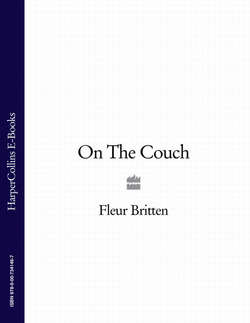Читать книгу On The Couch - Fleur Britten - Страница 9
12TH OCTOBER
Оглавление8am. Ollie’s alarm was screaming—he’d forgotten to turn it off from the day before. He slept on, but after just four hours’ sleep, I couldn’t. Grey daylight seeped in and the rain bore down. I peered out of the window. Amongst all the cloned, beige-brick residential blocks, I saw in one corner ‘1956’ picked out in red bricks. In the apartment’s oppressive silence, I didn’t know what else to do but return to my couch. Only now, sober, did I realise it smelt faintly of unwashed bodies and that under the thin foam was a rigid wooden board—it was like sleeping on a door. In the heat I was too uncomfortable to sleep. I thought about tea and food, and sent texts to The Emperor. We’d become so twinned I was finding it hard to cut off.
Some hours later I finally tiptoed out and stop-started my way towards the kitchen, hesitating outside Olga’s bedroom for an argument with myself: say good morning; no, don’t bother her. Well, you can’t just march into her kitchen. I’m hungover, I’m not in the mood. Well, that’s not good manners…
In London, I either lived alone or with The Emperor—I wasn’t used to dealing with people not on my terms.
Knock, knock.
‘Good morning,’ I croaked.
Olga was communing with her laptop at a wooden desk, in a study half the size of our room with a sofa like mine and no other sleeping apparatus—the sofa was her bed.
‘Hello,’ she replied.
She got up and formally introduced me to the kitchen. A waft of cooked eggs lingered.
We chatted briefly, then she returned to her room. Too inhibited to whip up a full breakfast, I poured myself a water from the kettle. This, I realised, was the point of Pay it Forward. If I’d hosted first, I’d feel more right to hospitality.
After a time, she returned.
‘Have you had breakfast?’ she asked.
‘Actually, I’d love a cup of tea.’ What I really wanted was a cappuccino.
‘Bfff, of course!’ From a tiny pot crammed with loose black tea, she poured a strong, cold shot into a mug and topped it up with boiling water—chai, Russian style, no milk. ‘Try some kefir as well—it’s good for hangovers.’
‘Sure!’ I pursed my lips to test the buttermilk. It was sour and unfriendly. ‘Maybe it needs sugar,’ I said, trying to sound optimistic.
The digital age might have brought instant connections, but that didn’t mean instant friendship. A force-field of unfamiliarity separated us. Olga hung around, so I had to sing for my breakfast. I didn’t feel like small talk, but I was couchsurfing: I had no choice. Eventually, Olga left to see her parents, and in her place, Ollie arose, boldly putting his foot up on the sideboard in the kitchen. He pulled up his trouser-leg to reveal a swelling the size of a computer mouse.
‘It’s not as bad as it looks,’ he said.
It looked hot and angry. I wasn’t convinced.
‘Chai?’ I offered. ‘Black, one sugar, coming up.’ I ferreted through her cupboards, looking for sugar. It felt strange to sense some kind of ownership over someone else’s apartment.
‘Arghhhh!’ Ollie had found a problem with the tea.
‘Did you burn yourself?’
‘No—you put salt in my tea. If Olga had made it, I probably would have politely drank it: ‘Hmm, this curious Russian speciality!’’
We made it into Moscow as the sun was setting. We ran dull errands, refuelled, and then met Olga at the beautiful 1930s Komsomolskaya metro station under the mosaics honouring its workforce, the Komsomol (or Communist Youth League). Olga was going to help us buy our Trans-Siberian rail tickets. ‘Always remember that the host is doing the surfer a favour,’ the website had chided. I couldn’t forget. She assumed the mothering role and we became the children: we’d left our passports and cash behind, turning a fifteen-minute task into one and a half hours.
‘I must have taken seven or eight of my guests to get their train tickets,’ Olga said.
I was confused: I felt guilty, and yet, it seemed, this was standard. The kindness of strangers—it really existed.
We felt an urge to take Olga to dinner. She chose an art-café-cum-bookshop, Bilingua, and, as we chatted, she told us how she had a ‘very special criterion’ when couchsearching. She’d search for ‘Godard’ or ‘Truffaut’ to locate fellow French cinema fans. She told us about Russia’s Country Ambassador, something of a celebrity in Moscow: a Philippino diplomat who often had four or five surfers staying at one time; he’d had over a hundred guests this year.
‘I don’t like it when homes are like hostels,’ Olga frowned.
There was even a couchsurfing monastery, she said, just outside Moscow: one shared room for couchsurfers, a curfew, and a task, such as painting the walls. Like opening a matrioshka, those sets of Russian nesting dolls, Olga’s twitchy, nervous shell had fallen away, and she seemed at last relaxed. Finally, the act of welcoming us into her home didn’t appear so masochistic.
We headed back and, unbidden, Olga looked up our train times and wrote out a role-playing station script for next time. And as we ate into her bedtime, my couchsurfing guilt reappeared. Christ, was this going to be like catholic guilt? I went to the kitchen to make tea, and found myself washing up, thinking about the selfish rewards of altruism: had Olga, too, gone to bed feeling good? Outside I heard the ghostly clatter of horses’ hooves—Olga had told us earlier that they belonged to gypsy girls who used them to beg. It was my reward.
